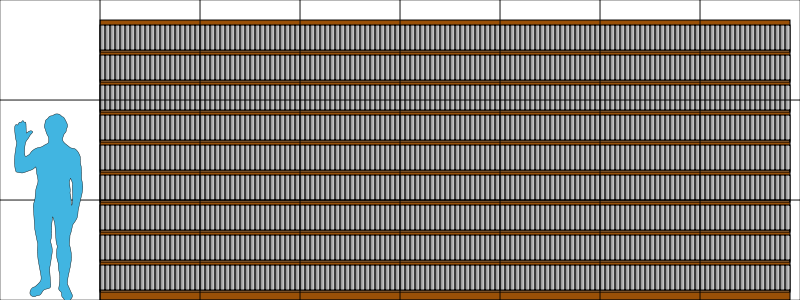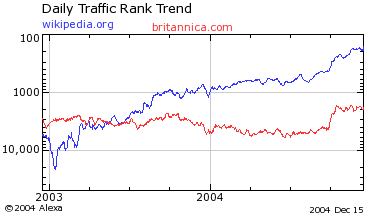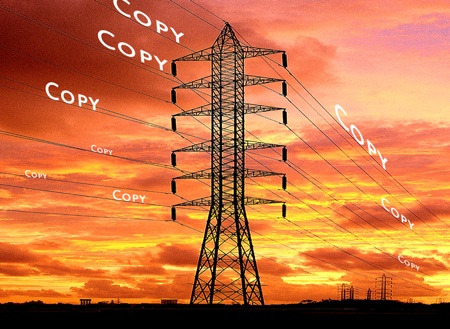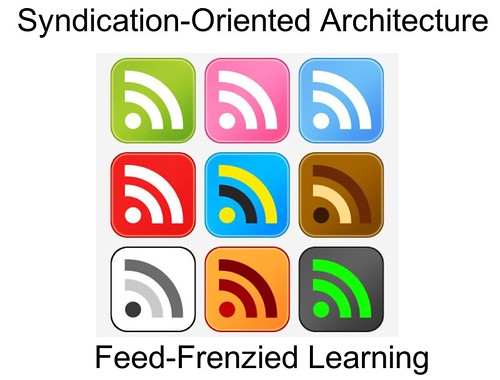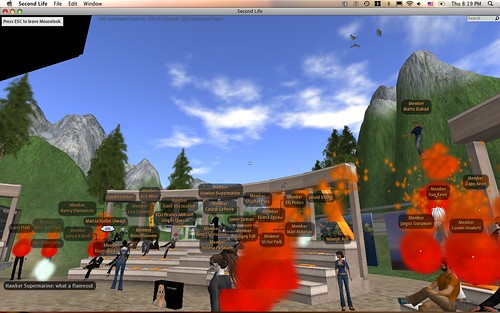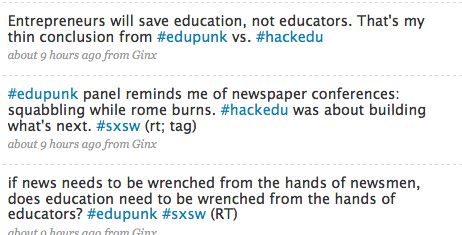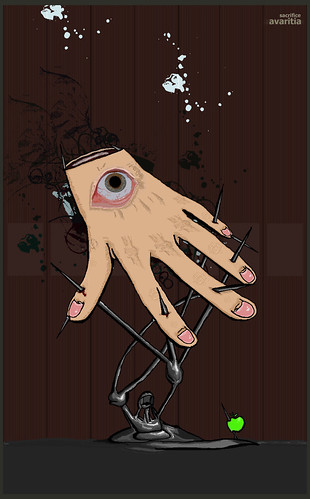Loosely Coupled
URL: http://tinyurl.com/zemos98
The urgency of open education
Your tormentor: Brian Lamb
Let's start with a movie. You can see more of the Canadian National Film Board film RiP: A Remix Manifesto here.
In addition to the obvious issues of copyright, and we determine the 'originality' of an idea, let's think about other ways that "the past" is asserting control over "the future"... and ways in which the essential properties of digital media are not understood by those who are making key decisions.

What works on the web?
Using volumes 25cm high and 5cm thick (some 400 pages), each page having two columns, each columns having 80 rows, and each row having 50 characters, ≈ 6MB per volume. As English Wikipedia has around 7.5GB of text (August 2007, length of wikitext counted by myself) ≈ 1250 volumes. Note that this is a conservative estimate, as it doesn't include images, tables etc. which take up more surface than the text which describes them.
- Murder, Madness, and Mayhem Project Page - the work of UBC Professor Jon Beasley-Murray, (Wikipedia Page, Blog)
- Article: El Señor Presidente
- The FA Team
What does this work appeal so much?
- fast, cheap, and out of control...
- augments traditional literacy with new media literacy
- results in genuinely useful public knowledge resources (perhaps the essence of open education resources)
- students will respond to tasks that are authentic

Flavours of blogs...
 Image by procsilas
Image by procsilas
- Blogs as content management system: OLT Website, Celebrate Learning, Digital Tattoo
- Community sites: Blog Squad, LEAP
- Portfolio: Michelle Chua
- Photos/Images: superNova K
- Portal: North of the Rio Grande, Survey of Spanish-American Literature to the 1820s - each contributing blog is on the student's choice of platform. (Note, these courses are led by Jon Beasley-Murray, the same prof behind the Murder, Madness and Mayhem Wikipedia authoring project.)
The crisis can be solved only if we learn to invert the present deep structure of tools; if we give people tools that guarantee their right to work with high, independent efficiency, thus simultaneously eliminating the need for either slaves or masters and enhancing each person's range of freedom. people need new tools to work with rather than tools that "work" for them. They need technology to make the most of the energy and imagination each has, rather than more well-programmed energy slaves.
I choose the term "conviviality" to designate the opposite of industrial productivity. I intended it to mean autonomous and creative intercourse among persons, and the intercourse of persons with their environments; and this in contrast with the conditioned response of persons to the demands made upon them by others, and by a man-made environment. I consider conviviality to be individual freedom realized in personal interdependence and, as such, an intrinsic ethical value. I believe that, in any society, as conviviality is reduced below a certain level, no amount of industrial productivity can effectively satisfy the needs it creates among society's members. - Tools for conviviality by Ivan Illich (p. 11)

The cost of sharing - cheap thrills
"The 'cost' of sharing has collapsed, but institutions don't know this. This means they behave in perfectly logical ways if sharing was still a costly activity. I am using the term cost here to refer to both a financial price and also the effort required by individuals.
Clay Shirky argues that the cost of organisation has disappeared, and I believe this is because sharing is easy, frictionless. If I come across something I share it via Google shared items, Twitter, my blog, etc. If I want to share I stick it up on Slideshare, my blog, YouTube. There is a small cost in terms of effort to me to do the sharing, and zero cost in anyone wanting to know what I share. Sharing is just an RSS feed away.
But institutions don't believe this, or know it. It used to take consortium agreements to share, conferences, best practice guides, incentives, metrics. How can all that be replaced by an RSS icon? Obviously it must be something different they reason, so for our needs we have to invent a system. Except it isn't." - Martin Weller
- UMWBlogs - "Two years worth of iteration and development given to Longwood in less than an hour."
- Recent case, in which an aggregated OER search engine was built for free by people who have never met. Became Free Learning OER Portal
- And how about MobileCourseDiscussions - open sharing in open formats reduces costs in environments we have not yet imagined...
"If you blow your works into the net like a dandelion clock on the breeze, the net itself will take care of the copying costs." -- Cory Doctorow, Think Like a Dandelion

Development: Publish from anywhere, reproduce it anywhere (we can dream, right?)
We have embraced a model of Radical Reuse. The essential component is RSS syndication.
- LEAP Embed Code via JSON: Original Page, Reproduced
- OpenCourseWareRSS as import for WordPress: Via Jim Groom
- Wiki Ink WordPress Plugin: So wiki maintained pages here can be represented here. D'Arcy Norman has done a screencast demo.
- Blog activity shortcode - used here
THE REVOLUTION WILL BE SYNDICATED - Jim Groom, Tom Woodward.

And speaking of Jim Groom, and just because you asked...
What's the deal with EduPunk?

My only cred on this issue is I was there when EduPunk was born. We talked about writing a punk-themed zine along the lines of Hackety Hack on how to run an ed tech operation for no money. (Later we did do something like that with a different theme, the survivalist-tinged Radical Reuse).
To me, and perhaps me alone, the great enduring value was in three posts Jim wrote right after that discussion.
- The Glass Bees - "Corporations are selling us back our ideas, innovations, and visions for an exorbitant price. I want them all back, and I want them now!"
- Permapunk - enter the idea of the learning party.
- Murder, Madness, Mayhem - discussed above.
It generated an ungodly number of blog posts, and garnered a surprising amount of attention outside the world of education.
The South by Southwest Panel
L-R: Jim Groom, Stephen Downes, Barbara Ganley, Gardner Campbell
- Audio here - revealed some strong divergences on the panel, some withering critiques from the audience backchannel...

The urgency
- We expected our business would remain blissfully unaffected even as the world of interactivity, constant connection and file sharing was exploding. And of course we were wrong. How were we wrong? By standing still or moving at a glacial pace, we inadvertently went to war with consumers by denying them what they wanted and could otherwise find and as a result of course, consumers won. - Edgar Bronfman, Warner Music Group
- The curious thing about the various plans hatched in the '90s is that they were, at base, all the same plan: "Here's how we're going to preserve the old forms of organization in a world of cheap perfect copies!" The details differed, but the core assumption behind all imagined outcomes (save the unthinkable one) was that the organizational form of the newspaper, as a general-purpose vehicle for publishing a variety of news and opinion, was basically sound, and only needed a digital facelift. As a result, the conversation has degenerated into the enthusiastic grasping at straws, pursued by skeptical responses. -- Clay Shirky, Newspapers, and thinking the unthinkable

It can't happen here?
- Link by Link - Don't Buy That Textbook, Download It Free: "This market is not working very well — except for the shareholders in the textbook publishers," he said. "We have lots of knowledge, but we are not getting it out."
- Let's think about Wikipedia (again) in comparison to Britannica, about YouTube (or Ted Talks), about the flood of open educational materials being released into the world, fledgling freelance professors, and learning parties.
"When copies are super abundant, they become worthless."
"When copies are super abundant, stuff which can't be copied becomes scarce and valuable."
-- Kevin Kelly, Better than Free
"Embracing the social means embracing the abundant - and emphasizing instead the way an organization might actually help people on the periphery generate value for themselves."
-- Douglas Rushkoff, Real social
Let's say for the sake of argument that we can't. Let's say it's just too overwhelming for the average consumer to sort through all the new voices available online, to separate fact from fiction, reporting from rumor-mongering. Let's say they need some kind of authoritative guide, to help them find all the useful information that's proliferating out there in the wild.
If only there were some institution that had a reputation for journalistic integrity that had a staff of trained editors and a growing audience arriving at its web site every day seeking quality information. If only… -- Steven Johnson

Let's revisit Girl Talk (and not think to0 much about the ironies involved with me showing clips of it here)...

